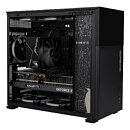Raspberry Pi OS Gets Its Newest Release
We've just published a new version of Raspberry Pi OS - our recommended (and free) operating system for all Raspberry Pi computers - and it's now available for download. Scroll to the bottom of this post to find instructions for updating, or read on to find out what has changed. As many of you already know, Debian Linux works on a two-year release cycle - every odd-numbered year, a new major version is released, and it being 2025, there will be one in the next few months.
So this is probably the final release of Raspberry Pi OS which is based on Debian 'bookworm', before Debian 'trixie' is released this summer. The last full release we made was back in November last year, and there have been quite a few changes since then, so here's a summary of the most important.
So this is probably the final release of Raspberry Pi OS which is based on Debian 'bookworm', before Debian 'trixie' is released this summer. The last full release we made was back in November last year, and there have been quite a few changes since then, so here's a summary of the most important.

























